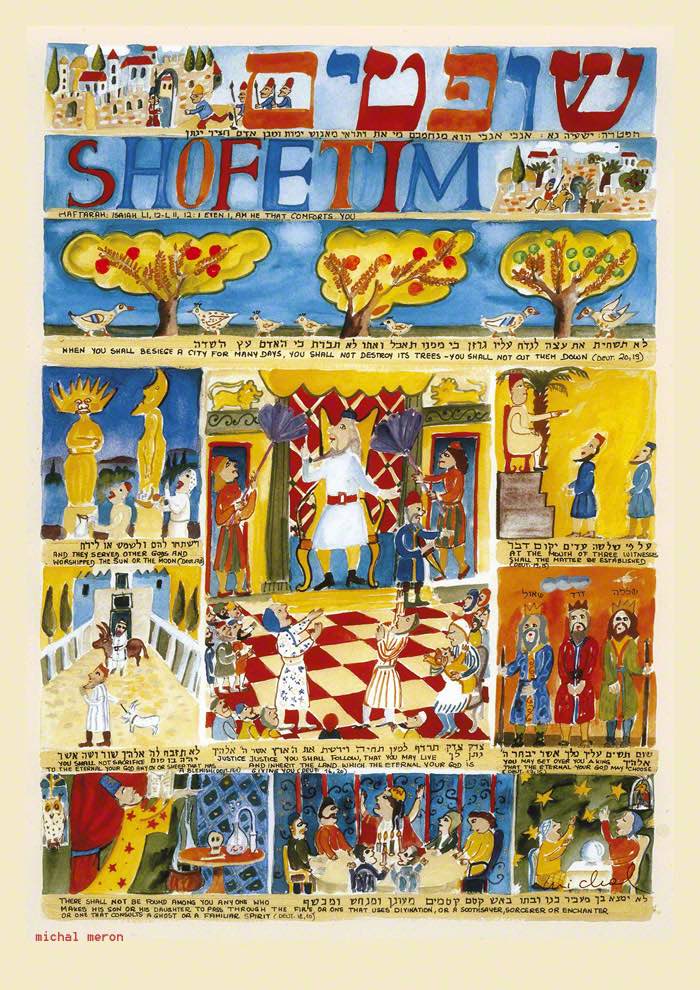Bonjour / Hello [nickname_else_first_name],
Table of contents
1) Perashat Hashavoua - Rabbi Eli Mansour
2) Halakhat Hashavoua (Halakhot related to day to day life)-Laws of Elul - Hazzan David Azerad
3) Holy Jokes!
1)PERASHAT HASHAVOUA
This Week's Parasha Insight with Rabbi Eli Mansour
Parashat Shoftim- Judging Ourselves
The Torah commands in Parashat Shoftim (16:20), "Sedek Sedek Tirdof" – that we must "pursue" justice. The verse continues, "in order that you live and take possession of the land…"
The Ramban brings an interpretation to this verse from the Midrash of Rabbi Nehunya Ben Ha’kaneh, which he says conveys a "Sod" ("secret"). According to this interpretation, the Torah here refers to "Midat Dino Shel Olam" – the judgment of the world, meaning, the judgment to which each and every person will be subject. We are urged to "pursue" "Sedek," judgment, instead of waiting to be judged. Before we stand trial, we should do the work of judging ourselves, identifying our faults and the improvements that need to be made, and then working to correct our behavior. The Torah urges us to take this initiative "in order that your live" – so that we earn long life. The best advice for securing a favorable judgment, for earning a happy, peaceful life, is to "pursue" our own judgment, to judge ourselves and work to improve our conduct, so that Hashem will not need to judge us.
Another source for this concept is a passage in the Tur (Orah Haim 581) citing the comment of the Midrash (Pirkeh De’Rabbi Eliezer) that Moshe went up Mount Sinai to receive the second set of tablets on Rosh Hodesh Elul, and on that day, the Shofar was sounded in Beneh Yisrael’s camp. The Shofar was sounded, the Midrash explains, as a warning to Beneh Yisrael that they should not sin during Moshe’s absence, as they had done previously, when they worshipped the golden calf while Moshe was atop Mount Sinai. The Tur writes that this is the source of the custom among Ashkenazic communities to sound the Shofar each day throughout the month of Elul. This is done, the Tur explains, in order to warn the congregation to repent in preparation for the judgment of Rosh Hashanah, and to "confound the Satan."
Beneh Yisrael took the initiative by sounding the Shofar when Moshe ascended the mountain as part of their effort to improve. They made a point of protecting themselves, of ensuring they would not repeat their previous mistake. This is an example of "Sedek Sedek Tirdof," of judging oneself and identifying flaws which needs to be corrected. When we take this initiative, we "confound the Satan"; he cannot bring any claims against us, because we preempted the judgment by judging ourselves and working to correct our mistakes.
This might be the meaning of the opening words of this Parasha: "Shofetim Ve’shoterim Toten Lecha" – "Place for yourself judges and law-enforcers." Several different interpretations have been given for the word "Lekha" ("for yourself") in this verse. In light of what we have seen, we might suggest that the Torah here tells us to make "judges" for ourselves so that we won’t need G-d to judge us. If we take the initiative to judge ourselves, seeing what we need to improve and then striving to improve, then we will not need to be judged by G-d, and we will then be worthy of a year filled with joy, success and happiness, Amen.
2) HALAKHAT HASHAVOUA
Selected & translated by David Azerad, Hazzan Maghen Abraham
Laws of the month of Ellul, according to the rulings of Maran Rabbi Obadiah Yosef ZT”L
What do you usually check in the month of Elul?
It is customary to check the Tefillin and Mezuzot in the month of Ellul. A person who does not know who wrote his Tefillin and Mezuzot should make more of an effort to check them.If one knows clearly that his Tefillin were written by a reliable scriber (Sofer) he is not obligated to check his Tefillin immediately he can wait a few years.With mezozot even if a person knows that they were written by a reliable scribe he should check them once every three and a half years.Some check them however every year in the month of Ellul.
Who should you be praying for during the days of Ellul?
One should try to pray during the days of Ellul for relatives and acquaintances so that they follow the way of the Torah and the Mitzvot ,because these days are days of mercy and desire, and it is the appropriate time to do Teshuvah.
Bevirkat Shabbat Shalom Umevorch
David Azerad
3) HOLY JoKeS!!
Selection of funny snippets, loosely related to this weeks parashah, to brighten your day

Jewish Art from Venice











